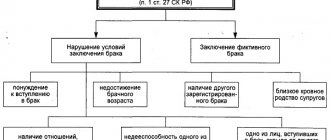When terminating a marriage by declaring it invalid, the legal consequences that arise after the court decision enters into legal force are of great importance for the spouses. After all, in fact, the court “rolls back” the entire family life up to the moment when the newlyweds said “yes” to each other at the registry office. And if there are children, will their rights be violated? After all, invalidity and divorce have completely different legal consequences, since the latter terminates the rights and obligations of the spouses in the future, and does not return them to their original position before marriage.
List of consequences of declaring a marriage invalid
As stated above, the legal consequences of declaring a marriage invalid are prescribed in Art. 30 clause 1 of the RF IC. If we turn to the rule of law, we can understand the significant difference between the termination of relations in government bodies and the recognition of a union by a court decision as invalid.
When a court makes a decision to annul a relationship between two citizens, the rights and obligations of the individuals do not arise, which occurs at the time of official termination. In other words, the court annuls all possible rights and obligations of the subjects of legal relations that arose at the time of registration of the marriage relationship and before they were declared invalid, in the absence of the conditions prescribed in clauses 4 and 5 of Art. 30 IC RF.
This means that persons whose marriage has been annulled must accept all the consequences of annulment. This includes the inability to claim maintenance. Also, the consequences of declaring a marriage invalid include the lack of the right to division of property that was acquired during the time since the marriage. Each party has the right to use only the property that is registered in its name, for example, a share in an apartment, a car, and so on.
In fact, when a marriage is declared invalid, this does not entail any legal consequences for its participants. After all, the court decides that this marriage did not exist, that is, the former spouses do not owe each other anything. An exception is situations where the court found one of the spouses to be in good faith, that is, his rights upon marriage were violated, and he himself acted according to the law. These cases are stipulated separately in the legislation.
A significant difference between the procedure for recognizing marriage ties as invalid and terminating relations between the participants is that in the first case, the rights and obligations of persons are canceled by government agencies with retroactive effect, i.e. from the moment of marriage, and not vice versa, as happens during divorce.
The invalidity of marriage is a legal institution of family law of the Russian Federation, which allows the participants in family relations to be returned to the position that preceded the moment of conclusion of the union. This also determines the fact that the spouses do not have personal and property relations, as happens in a registered marriage, which is interpreted by Article 30, paragraph 1 of the RF IC. These are serious consequences of declaring a marriage invalid.
Legal assistance
Disputes regarding the annulment of a marriage are difficult for either party. The specialists of MCPI “Planet of Law” are ready to offer the maximum possible range of legal services, both within the framework of a special program of full legal support “Divorce without stress”, and in the form of separate services determined on an individual basis.
Don’t delay in contacting professionals! After all, the more time is lost, the more difficult it will be to understand the intricacies of your problem and find the right solution. Call +.
Question about property
The consequences of declaring a marriage invalid largely relate to property issues. Property relations that preceded the procedure for making a decision on the invalidity (nullity) of a marriage are regulated by the Civil Code of the Russian Federation, precisely by Articles 244-252. In other words, the rules of shared ownership apply to property, and not common property, as happens in the process of dissolving a marriage. This means that if the marriage has been annulled, then all things and real estate purchased by the parties since the date on which it was concluded cannot be divided between them, as between spouses in a divorce.
The distribution of shared ownership occurs by agreement of both participants or by court decision. As practice shows, in most cases the shares are equal. But if one of the spouses can provide evidence of a greater contribution to the property (personal physical labor, money), then the judge has the right to award him a share proportional to his contribution.
The procedure for owning shared property is determined by agreement of the former spouses. But at the same time, each of them can dispose of their allocated part at their own discretion, in other words, real estate can be donated, sold, pledged, but this takes into account the preemptive right to acquire a share by another participant in property relations.
The consequences of declaring a marriage invalid may lead to the fact that the former spouses will not be able to peacefully decide who will own what property in the future. If it is not possible to find agreement between the spouses on a voluntary basis on the disposal of real estate and the allocation of a certain share, then the persons have the right to file a statement of claim in court. In this case, the authority makes a decision either to allocate a share in kind, or to award the person compensation for the value of the property share in monetary equivalent. But after the subject becomes the owner of compensation, he completely loses any rights to a share in the property.
The law considers alienation of part of the property possible only if the property was acquired by both spouses using common finances. If residential and commercial premises were purchased with funds and in the name of one of the persons in the marriage relationship, then the other participant has no right to claim alienation of a share in it. These are the consequences of declaring a marriage invalid.
Arbitrage practice
In practice, 99% of claims for recognition of the illegality of marriages are satisfied. The fact is that the norms regulating this procedure prevent violations of the procedure already at the stage of accepting applications. And in the case of simple unwillingness to be married, it is much easier to get a divorce than to start the recognition procedure.
The most prominent cases of this kind in Family Law are claims for moral damages. The fact is that it is almost impossible to prove moral suffering. One can compare mental suffering with the prices of neurologists and psychotherapists, but even when presented in court with medical evidence of such harm (in the amount of up to 500,000), the court refused to satisfy.
The exception is marriages with a prenuptial agreement, in which this probability is indicated. But in Russia there are only a few such cases. By the way, in some Western countries it is much easier to obtain compensation for moral damage than recognition or divorce itself. The difference is that Russian courts are based on articles and norms of legislation, while Western courts consider each claim on a private basis.
Does the annulment of a marriage affect the rights of children?
The legal or legal consequences of declaring a marriage invalid have and do have an impact on the rights of children to a very minimal extent. The law states this quite specifically, in particular Art. 30 IC RF. Clause 3 of Art. 30 implies that the invalidity of the parents' marriage does not affect the legal rights and interests of children who were born at the time of such a union or 300 days after the court decision to annul the relationship. That is, the consequences of declaring a marriage invalid practically do not affect the rights of children born in this marital relationship.
If we analyze this norm more specifically, the following principles can be derived from it:
- The father of a child who was conceived or born during marriage is recognized as the mother’s husband – the former spouse. Other circumstances must be proven through the judicial authorities by providing arguments in the manner prescribed by law.
- A child from a marriage declared invalid has the right to the first name, patronymic and last name given to him upon registration of his birth. The consequences of declaring a marriage invalid do not apply to him in this regard.
Children can communicate with both parents, regardless of their place of residence, unless otherwise prohibited by a court order, and also receive affection and care from them.
The property and inheritance rights of a child do not depend on the method of termination of the marriage relationship, whether it was a divorce procedure in the registry office or annulment of the union through the court.
Rights of a conscientious spouse
Despite the fact that Art. 30 of the RF IC states that the invalidity of a marriage does not imply the emergence of any rights and obligations for the spouse; the law provides for some exceptions to the general rule. A spouse whose interests were violated at the time of marriage by concealing obstacles to such a union may demand that the second party in the legal relationship observe his rights by applying to a judicial authority. The consequences of declaring the marriage invalid will be different for him.
In such a case, the court takes into account several grounds, the recognition of which is required by a bona fide partner.
- Awarding alimony from the second participant in the relationship, whom the court finds guilty of entering into a fictitious marriage in accordance with Art. 90-91 RF IC.
- In the process of dividing property, the principle of common joint property is applied, which also provides for the procedure for dissolution of marriage relations (Articles 34,38,39 of the RF IC).
- A marriage contract can be recognized as valid if it takes into account the rights of a person, in other words, a conscientious spouse, who is represented in government agencies by a qualified lawyer.
The possibility of recognition by representatives of the judicial authorities of the validity of the marriage contract and the principle of common joint use of real estate during its division exists only at the moment when there is a paramount need to protect the legal rights and interests of the person affected by such a marriage. These are the main legal principles of family law in the Russian Federation.
Compensation for material and moral damage to a conscientious spouse
In addition to the circumstances listed above, a bona fide partner, whom the court considers to be a victim, has the right to demand compensation for material and moral damage from the ex-spouse. This is regulated by law, in particular Art. 30 clause 4 of the RF IC, as well as 15, 151, 1064, 1082, 1085, 1100 and 1101 articles of the RF Civil Code. This is also included in the consequences of declaring the marriage invalid.
If we turn to the modern legal dictionary, the concept of moral harm means the derogation of a person’s intangible benefits that are protected by law. This concept implies, for example, causing harm to the health of the subject of legal relations.
In the event that we are talking about the extent of the harm caused, i.e. about the monetary equivalent, this implies material or property damage. At the same time, the concept of property damage may arise in the event of a violation of any rights of a conscientious spouse. When compensating for property damage, the general principle applies is that there is a complete return of lost valuables.
A person whom the court finds guilty of causing material harm (unfair spouse) undertakes to compensate all losses to the injured citizen, as stated in Art. 15 Civil Code of the Russian Federation.
In addition, regardless of the amount of compensation for property damage, the court has the right to award monetary compensation for moral damage. This takes into account the degree of guilt of the dishonest spouse and the principle of a fair and reasonable demand for compensation for moral distress.
Loss of rights to alimony
The consequences of declaring a marriage invalid include the condition that if one of the spouses was found by the court to be in good faith, that is, he was forced or deceived into entering into marriage, then the law does not allow him to demand alimony.
When a marriage is declared invalid, the rights to alimony are lost, which is regulated by legal acts. This is due to the fact that demanding any payments from a conscientious spouse would be an unfair act. In this case, the court will not take into account the grounds confirming the fact of financial need for additional financial support or incapacity for work. This is due to the fact that the former spouse can receive similar compensation from a third party by decision of the court.
The consequences and grounds for recognizing a marriage as invalid presented in the article apply only to those unions that were concluded on the territory of Russia. If a marriage is registered under foreign law, then in such cases the norms of the country where this union received legal force are adopted. And the consequences of declaring a marriage invalid may differ from those that have to be dealt with in Russia.
Author of the article
Signs
By the absence of such circumstances between the spouses, it can be understood that the concluded family union is not real:
- intimate relationships;
- moral support;
- living together in a common area;
- communication;
- ignorance of basic facts from each other’s lives;
- general budget and things.
The pursuit of extraneous goals (evasion from military service, obtaining citizenship) is also one of the characteristic features of such violations.







